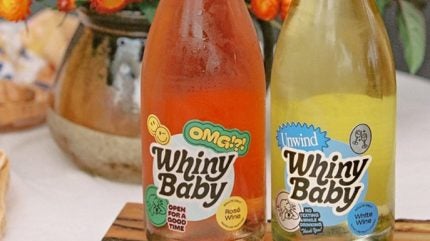
Amid the debates about by Gen Z’s interest in alcohol, the wine industry in particular has been wrestling with what the demographic thinks about its products.
“I think wine and wine language is quite intimidating for younger consumers. Asking for the wine list, being able to pronounce certain names, knowing your way around wine, it’s highly complex,” Rollo Gabb, the MD South African wine group Journey’s End, told Just Drinks earlier this year.
In 2024, global wine consumption fell to its lowest since 1961. In the US, the world’s largest wine market, consumption decreased almost 6%. In fact, consumption dropped in four of the world’s top five markets last year, save for Italy where consumption was level. Alongside the US, France, the UK and Germany all saw volumes slide.
Announcing the figures, the International Organisation of Vine and Wine (OIV) said wine has to contend with shifting social habits and generational changes in consumer behaviour. Other factors like Covid-19 and the Ukraine conflict had also contributed to a troubled global market, the OIV said, but, notably, John Barker, the organisation’s director general, said the wine sector had to adapt. “Working together to develop solutions to climate change and making wine a beacon of sustainability, investing in research on new audiences so that we can see wine through their eyes, reinforcing our commitment to multilateralism and global trade: these are the elements that will lead the wine sector forward,” he said.
In the spirit of attracting a new audience, this week Gallo, one of the biggest names in wine, snapped up Whiny Baby, the California-based business launched five years ago to make wine more approachable for Gen Z drinkers.
In a post on Instagram (no doubt the network was selected accordingly) Gallo said: “Created by Jess Druey, Whiny Baby is all about making wine fun, fresh and approachable. Together, we’re on a mission to welcome the next generation of wine lovers.”

US Tariffs are shifting - will you react or anticipate?
Don’t let policy changes catch you off guard. Stay proactive with real-time data and expert analysis.
By GlobalDataDruey (then 22) set up Whiny Baby in 2020 after “a first-date trip to the wine aisle left me lost and uninspired”. She says: “That moment sparked a brand to make wine fun, approachable and built for my generation.”
Cannily, two years ago, Whiny Baby formed a venture with US wine business McBride Sisters Wine Company covering production and distribution. The business has since grown to nationwide listings across major US retailers including Albertsons, Target and Whole Foods Market, as well as specialists like Total Wine & More.
Announcing the acquisition on LinkedIn, Whiny Baby founder Druey described the deal as “a dream come true”. As ever when an industry giant plucks a brand that’s carved out a niche with a much-sought-after audience, it will be so important Gallo doesn’t forget what made it move for Whiny Baby in the first place.
Druey said she would have a role “consulting on emerging consumer innovation” and “innovating across their portfolio while reimagining Whiny Baby with the same mission: welcoming the next generation into wine”.
Barefoot and Dark Horse brands owner Gallo has the production and distribution muscle but it’s important the company retains Druey’s brand-building experience. Whiny Baby has built a significant following not just on Instagram but also on TikTok. Meanwhile, the whole Whiny Baby brand positioning centres on making its wines “accessible and chill-able”, with bold and playful labels that don’t over-complicate what the company is offering. It won’t be for everyone but it’s clearly paid off – and now Gallo wants a piece of the action.
Courtney O’Brien, a former Gallo director and now founder of her own consultancy, The Outlier Initiative, says Whiny Baby’s community, the “smart” way the company built its distribution and “accessible” pricing likely made the business “stand out” to her former employer.
“This is a case study in what acquirers really buy,” she reflected on LinkedIn when the deal was announced. “Large companies can add distribution. What they can’t easily add is rabid fans, cultural pull, or community. Acquirers don’t pay for what they can already do themselves. They pay for what’s hard to replicate: loyalty, voice, repeat.”
Last month, US research and polling organisation Gallup published a survey that showed 54% of US adults say they consume alcohol – a record low. In the poll’s nearly 90-year history, the previous low was 55% in 1958.
The consumers are out there, give them what they want. Not more of the same
Erle Martin, IV Wine Group
Against that backdrop, Erle Martin, an ex-Crimson Wine Group and Winebow executive, believes Whiny Baby shows how brands can succeed.
“The future of brand-building in this industry lies in community-centric approaches, cultural relevance and memorable customer experiences. Brands that resonate with their audience on a deeper level and foster genuine affection will thrive in an increasingly competitive market,” Martin, founder of advisory firm IV Wine Group, says.
“Whiny Baby’s success serves as a testament to the value of authenticity and emotional connection in brand development, highlighting the importance of genuine relationships over traditional marketing strategies. The consumers are out there, give them what they want. Not more of the same.”
The deal marks Gallo’s first acquisition in wine for two years. More recently, the company has been either closing or selling off wine assets, with its M&A activity outside wine.
However, Gallo’s shrewd move for Whiny Baby underlines the group still has the appetite to invest inorganically in its core business. Now the company has to back that up and delicately help its new asset continue to grow.





